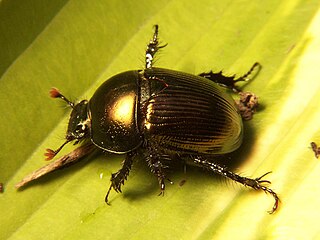
Eucanthus is a genus of earth-boring scarab beetles in the family Geotrupidae. There are about eight described species in Eucanthus.
Haroldiataenius is a genus of aphodiine dung beetles in the family Scarabaeidae. There are about nine described species in Haroldiataenius.
Euparixia is a genus of aphodiine dung beetles in the family Scarabaeidae. There are about 10 described species in Euparixia.
Oxygrylius is a genus of rhinoceros beetles in the family Scarabaeidae. There are at least two described species in Oxygrylius.
Hypothyce is a genus of May beetles and junebugs in the family Scarabaeidae. There are at least three described species in Hypothyce.
Leptohoplia is a genus of shining leaf chafers in the family of beetles known as Scarabaeidae. There are at least two described species in Leptohoplia.
Phobetus is a genus of May beetles and junebugs in the family Scarabaeidae. There are about 11 described species in Phobetus.
Dialytes is a genus of aphodiine dung beetles in the family Scarabaeidae. There are about five described species in Dialytes.
Podostena is a genus of May beetles and junebugs in the family Scarabaeidae. There are at least four described species in Podostena.
Odontopsammodius is a genus of aphodiine dung beetles in the family Scarabaeidae. There are about 12 described species in Odontopsammodius.

Hybosorus is a genus of scavenger scarab beetles in the family Hybosoridae. There are about seven described species in Hybosorus.
Aphonus is a genus of rhinoceros beetles in the family Scarabaeidae. There are about six described species in Aphonus.
Isodacrys is a genus of broad-nosed weevils in the beetle family Curculionidae. There are about 14 described species in Isodacrys.

Dyscinetus is a genus of rice beetles in the family Scarabaeidae. There are at least 20 described species in Dyscinetus.
Genuchinus is a genus of fruit and flower chafers in the family of beetles known as Scarabaeidae. There are about 10 described species in Genuchinus.
Bolbocerastes is a genus of earth-boring scarab beetles in the family Geotrupidae. There are at least four described species in Bolbocerastes.
Podolasia is a genus of May beetles and junebugs in the family Scarabaeidae. There are about 11 described species in Podolasia.
Coscinocephalus is a genus of rhinoceros beetles in the family Scarabaeidae. There are at least two described species in Coscinocephalus.





